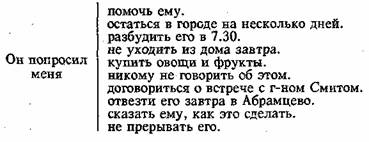При переводе повествовательного предложения из прямой речи в косвенную производятся следующие изменения:
а) повествовательное предложение вводится союзом that, который, однако, часто опускается.
Не says, "They will achieve success". — He says (that) they will achieve success.
б) личные и притяжательные местоимения заменяются по смыслу:
Не says, 'Tve just seen your elder brother." — He says (that) he has just seen my elder brother.
в) если после глагола to say имеется предложное дополнение, указывающее на лицо, к которому обращена речь, то он заменяется глаголом to tell.
She has said to me, "I'm awfully tired." —*- She has told me that she is awfully tired.
Если глагол в главном предложении стоит в Simple Past, Past Continuous или Past Perfect, то время глагола прямой речи должно быть заменено в соответствии с правилами согласования времен.
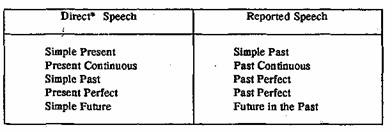
При переводе из прямой речи в косвенную заменяются следующие указательные местоимения, наречия времени и места:
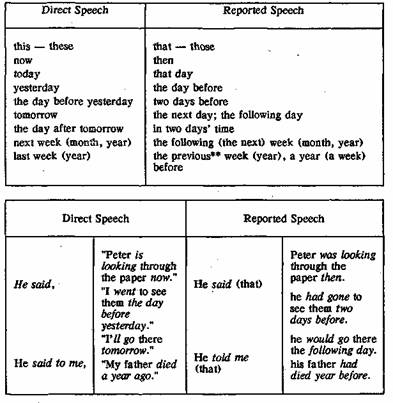
* direct [di'rekt] прямой
** previous ['pri:vias] предыдущий, предшествующий
ПРИМЕЧАНИЯ: 1. При переводе из прямой речи в косвенную Simple Past и Past Continuous могут сохраняться без изменений, если указано время совершения действия.
Не said, "Bernard Shaw visited the Soviet Union in 1928". — He said that Bernard Shaw visited the Soviet Union in 1928.
She said, "I met my schoolteacher when I was getting out of the train at Victoria Station". — She said she met her schoolteacher when she was getting out of the train at Victoria Station.
2. При переводе из прямой речи в косвенную Past Perfect не изменяется.
Не said to me, "The book had been out by last June". — He told me (that) the book had been out by the previous June.
3. а) Если говорящий сообщает о происходящем в тот же день, то наречия времени не изменяются.
At breakfast this morning he said, "I'll be very busy today". — At breakfast this morning he said that he would be very busy today.
б) Наречия будущего времени могут корректироваться в зависимости от того, когда передается косвенная речь.
On Monday John says to Tom, "I'm leaving the day after tomorrow." On Tuesday Tom sees Bill and says to him, "John said he was leaving tomorrow." On Wednesday Tom may say to Ben, "John said he was leaving today".
Exercise 1. Give the three forms of the following verbs.
to be, to say, to tell, to speak, to talk, to hear, to have, to see, to take, to give, to attend, to phone, to go, to enjoy, to become, to get, to write, to leave, to buy, to remember
Exercise 2. Read and translate these sentences.
1. He said he had not heard anything about it. 2. He said that Peter has booked tickets fot the theatre the previous week. 3. Mr Stone told me that the meeting would take place the following month. 4. He said the secretary had already phoned Mr Brown. 5. Peter said that the Spartak players had scored three goals before the end of the first half. 6. He told them he would speak to Mr Smith about it if he saw him the next day. 7. Jane said she would join us the next day. 8. Ann said she was going out that night. 9. She said she had attended Professor Davy's lecture the previous day. 10. Miss Brooks said that Mr Dodd was speaking on the phone then. 11. She said her husband was manager in a big factory. 12. He said that Byron was bora on January 22, 1788. 13. He said that he met Ann when he was going to the supermarket.
Exercise 3. Choose the proper adverb or the adverbial phrase.
1. Mr Brown said the manager would be back in London (tomorrow, the following day). 2. He says he enjoyed the film (yesterday, the previous day). 3. The secretary told Mr Black that Mr Brown had called him up (two hours ago, two hours before). 4. The secretary said Mr Brown was engaged (now, then). 5. Mary says she will book tickets for the cinema (tomorrow, the next day). 6. The journalist said that Bondarev's new novel would be out (next month, the next month). 7. He said that he had finished his new collection of stories (last month, the previous month).
Exercise 4. Choose the proper tense-form of the verb.
1. He said the novel (is, was) very interesting. 2. Mary said the weather forecast for the next day (is, was) bad. 3. He told her that many of the students (will go, would go) to the football ground the next day. 4. The boys say they always (have suppoted, had supported) Spartak. 5. Peter said he (will attend, would attend) the Music Festival if it (takes place, took place) the following June 6. Miss Hornby says that there (is, was) a message for Mr Brown. 7. He said he (will finish, would finish) his new collection of poems the following May.
Exercise 5. Make up conversations according to the model.
A: The film impressed me greatly.
B: What did he sa?
C: He said (that) the film had impressed him greatly.
1. Jack London's northern stories made a great impression on me. 2. John has just gone on a trip. 3. Bill's brother has given up college. 4. The weather is wonderful today. 5. They are interested in art. 6. She is making a living as a clerk.
Exercise 6. Transform direct speech into reported speech. Make the necessary changes.
1. She said to me, "We'll go boating tomorrow". 2. He said, "We'll stage this play if you help us". 3. The secretary said, "I've got a message from Mr Green". 4. Mr Nelson said, "Shaw was awarded the Nobel Prize for Literature in 1925." 5. The old man said to me, "I met her many years ago". 6. Mr Smith said, "They had lunch on the train two hours ago". 7. She said, "I'm leaving for London tomorrow".
Exercise 7. Make up ten sentences using reported speech.
Exercise 8. Translate into English.
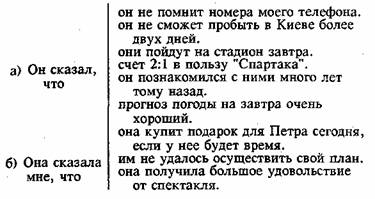
Reported Questions (Вопросы в косвенной речи)
1. При переводе прямого вопроса в косвенный он превращается в дополнительное придаточное предложение. Вопросительный порядок слов заменяется порядком слов повествовательного предложения — глагол-сказуемое ставится после подлежащего. Личные и притяжательные местоимения заменяются по смыслу.
2. Если в главном предложении глагол-сказуемое стоит в форме прошедшего времени, то в косвенном вопросе необходимо соблюдать правила согласования времен.
3. При переводе общих вопросов в косвенные они присоединяются к главному предложению с помощью союзов if или whether, которые переводятся на русский язык частицей ли.
John asked the secretary whether Mr Brown had come back.
Джон спросил секретаря, вернулся ли г-н Браун.
ПРИМЕЧАНИЕ: При передаче в косвенной речи ответов на общие вопросы слова yes и по опускаются.
Не answered, "Yes, I can." ("No. I can't.") — He answered that he could (he couldn't).
4. Специальные вопросы в косвенной речи вводятся соответствующими вопросительными словами.
Не asked Jane, "Who won the last swimming event?" — He asked Jane -who had won the previous swimming event.
She asked Bill, "How old is John's father?" — She asked Bill how old John's father was.
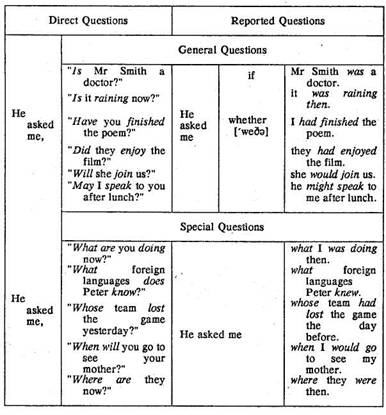
5. Если прямую речь вводит глагол to say, то в косвенной речи он заменяется глаголами to ask, to wonder, to want to know.
She said, "John, when are you leaving?" — She asked John (she wondered, she wanted to know) when he was leaving.
Exercise 9. Transform direct questions into reported. Pay attention to the sequence of tenses. Translate the reported sentences.
1. "Is the Music Festival taking place in Edinburgh now?" Mary asked him. 2. "What's the weather like in Moscow now?" Mr Smith asked him. 3. "Was it a cup game?" she asked her brother. 4. "Are you tired?" she asked Jane. "Yes, I am,"Jane answered. 5. "Can you help me translate this article today?" John asked Bill. 6. "How long did you stay there?" John asked him. 7. "When shall we meet?" he asked Bill. 8. "What's the title of the book you are reading?" Mary asked Jane. 9. "Where shall we go for the week-end?" Jane asked her husband.
Exercise 10. Make up dialogues according to the model.
A: John asked me, "Are they coming to see us tonight?"
B: What did John ask you?
A: He asked me if they were coming to see them that night.
1. How long did it take him to write the novel? 2. When will the next match take place? 3. May I have breakfast now? 4. Will you be able to come to the party? 5. When did he make a world tour? 6. What's the score? 7. What hotel are they going to stay at? 8. Who is the message from?
Exercise 11. Complete these sentences.
1. He asked me if... 2. She wondered how long... 3. John asked Peter what... 4. Mr Blackwood asked the secretary how many... 5. She asked him what time... 6. She wondered How much... 7. He asked me whether...
Exercise 12. Put these jokes into reported speech.
1
Wife: Do you want to see the beautiful present I bought for your birthday?
Husband: What is it? Wife: I'll put it on in a minute.
2
A schoolboy said to his father: "We gave a wonderful performance at school. A lot of parents came and they enjoyed it."
"How do you know?" asked the father.
"They laughed all through the play," the boy answered.
"And what was the play?"
"Hamlet," said the boy.
Exercise 13. Translate into English.
1. Он спросил Джона, знает ли он прогноз погоды на завтра. 2. Он спросил г-на Стоуна, куда они собираются поехать в отпуск. 3. В своем письме он спрашивал Джона, может ли он заказать билеты на самолет. 4. Билл спросил жену, что идет в их местном кинотеатре. 5. Между прочим, г-н Браун спросил меня, сможем ли мы заехать к ним в субботу. 6. Он спросил кассира, когда отходит поезд на Эдинбург. 7. Г-н Смит спросил его, смогут ли они решить этот вопрос до следующего понедельника. 8. Джон спросил Билла, сколько времени он пробыл в Москве в прошлом году.
4. Reported Commands and Requests* (Приказания и просьбы в косвенной речи)
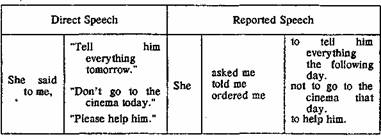
* Рекомендуется проходить этот материал перед началом работы над 3 разделом.
1. Приказания и просьбы в косвенной речи вводятся глаголами to ask (по)просить, to tell велеть, сказать, to order приказать.
Следует помнить, что за глаголами to tell, to ask, to order всегда следует косвенное дополнение, к которому относится просьба или приказание. Если предложение, вводящее прямую речь, не содержит косвенного дополнения, то вводится личное местоимение, обусловленное контекстом.
She said, "Don't book tickets for the theatre for next Friday." She asked me not to book tickets for the theatre for the following Friday.
ПРИМЕЧАНИЕ: Глагол to order употребляется сравнительно редко, так как он очень категоричен.
2. Глагол в повелительном наклонении заменяется инфинитивом. Отрицательная форма инфинитива образуется путем прибавления отрицания not (to go — not to go).
3. Указательные местоимения, наречия времени и места заменяются в соответствии с правилами согласования времен.
Exercise 14. Transform direct speech into reported speech.
1. "Please show them round the city," Peter said to him. 2. "Please don't call me up before Wednesday," Mr Dobson said to him. 3. "Please phone Mr Petrov," Mr Dodd said to the secretary. 4. "Please ask Mr Mitchell to wait for a little while," Mr Smith said to the secretary. 5. "Don't send the papers yet," he said to the secretary. 6. "Please show me another pair of shoes," the customer said to the shop-assistant. 7. "Don't buy any bread today," Mary said to her son. 8. "Please don't come back very late," Peter said to his daughter. 9. "Please try on these shoes," the shop-assistant said to the customer.
Exercise 15. Make up dialogues according to the model.
John (to Ann): Please show me your new English textbook.
Peter (to Max): What did John say to Ann? Max: He asked her to show him her new English textbook.
1. Take a seat, please. 2. Have a cup of tea, please. 3. Don't buy any oranges today. 4. Please don't go out tonight. 5. Please show me round the city tomorrow. 6. Please book two train tickets. 7. Don't be late for the theatre, please.
Exercise 16. Translate into English.
